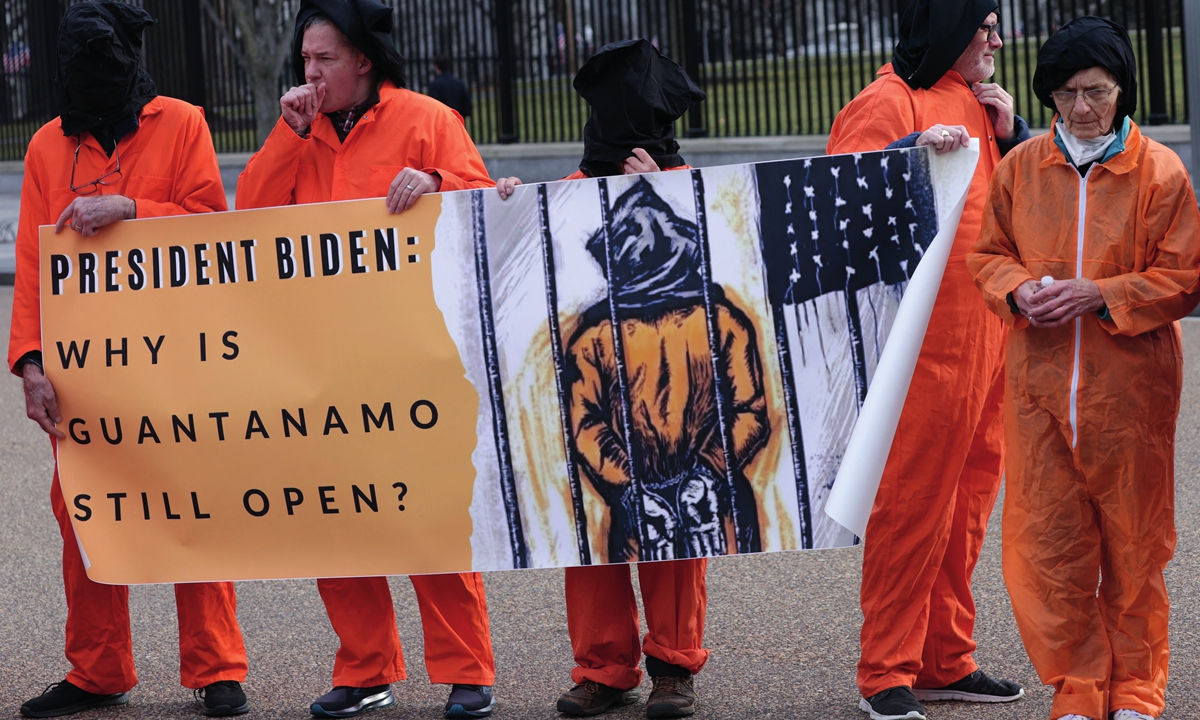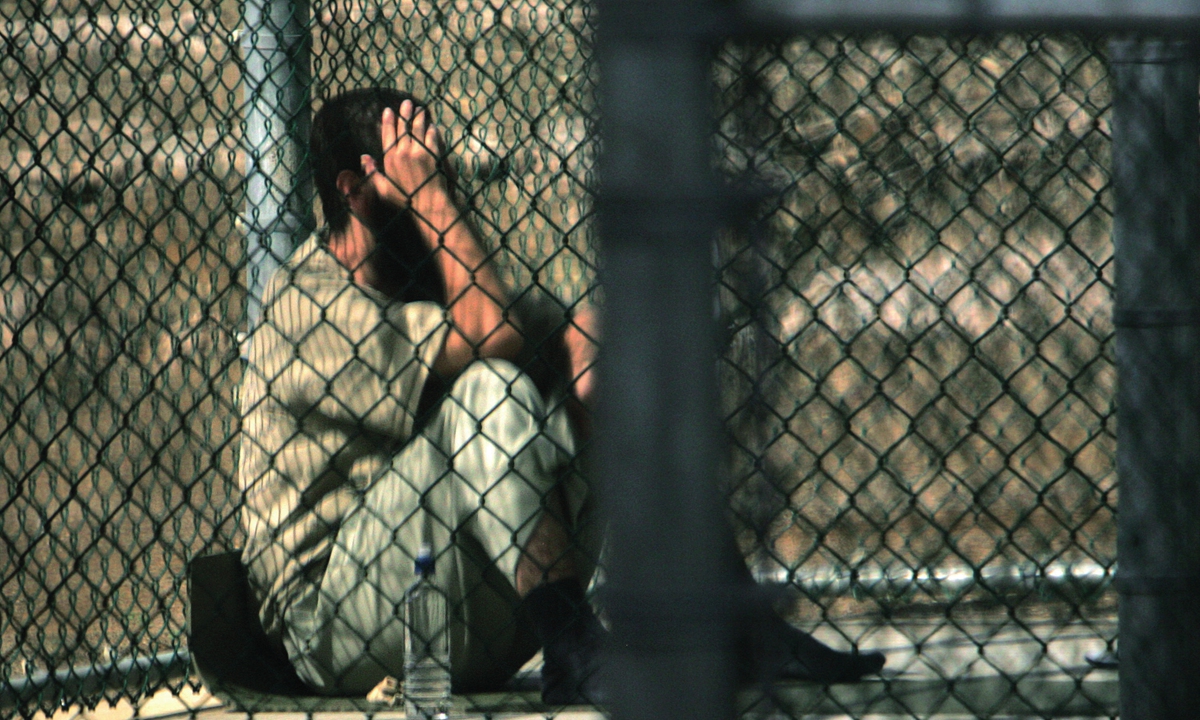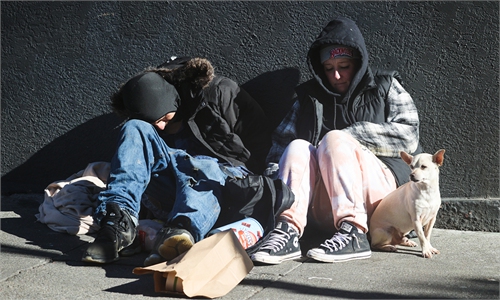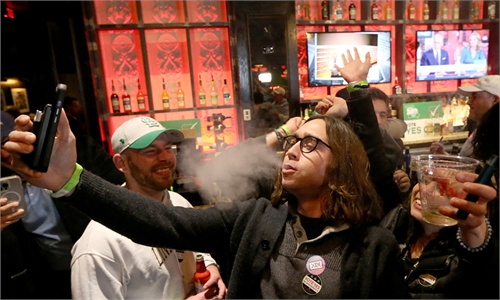IN-DEPTH / IN-DEPTH
GT investigates: US tramples on human rights, throws people into black prisons and custody centers

Activists in orange jumpsuits, representing the 35 men who are still being held at the US detention facility in Guantanamo Bay, Cuba, protest in front of the White House on January 11, 2023 in Washington, DC. Photo: AFP
Editor's Note:
While the US continues to buy into the dual fallacy of being the "city upon a hill" and a "beacon of democracy," the reality on the ground tells a different story - an increasingly large swathe of the American population struggling with drug abuse, growing worries around gun violence, an ever-widening economic gap between the haves and the have-nots, intensifying political polarization, more arbitrary detention of and hatred toward minorities... These sustained forms of unrest not only exacerbate social inequality and worsen domestic human rights conditions, but also expose US hypocrisy as it is unable to resolve its own issues, yet never stops criticizing other nations' human rights records.
The Global Times is publishing a series of articles that examine these and other sociopolitical and economic forms of chaos in the US. This is the fourth installment in the series that looks into the judicial chaos running rampant in the country which wantonly carried out arbitrary detention and seriously infringes on human rights.
While being an important contributor to the drafting of the United Nations (UN) Universal Declaration of Human Rights (UDHR) which clearly states that freedom from arbitrary detention is a fundamental human right as well as a party to many other international human rights treaties, the US, however, has become an "empire of arbitrary detention."
In total disregard of said international human rights treaties, the US has inflicted lifelong physical and mental harm upon many unlawfully detained so-called prisoners, while neither abetting nor apologizing, analysts pointed out.
In the US' long history of arbitrary detention and disregard of human rights both at home and abroad, experts have also pointed out that a pattern of the country's deep-seated political culture of racism and violence is evident.
In a report released by the Xinhua News Agency last week, the truth and facts regarding the US' arbitrary detention are chronicled and have received widespread attention. Once again, however, such attention on systemic issues has fallen on deaf ears among US politicians and media outlets.
"The US' history of arbitrary detention has long existed and the country's authorities have clearly known about it, but they keep attempting to cover up the problem," said human rights expert Zhu Ying, director of the US studies center at the Southwest University of Political Science and Law.
"As a US domestic scandal, most Senators, members of the House of Representatives, and state lawmakers try to avoid the issue, and US media outlets also rarely reveal it," Zhu told the Global Times.
At a routine press conference, Chinese Foreign Ministry spokesperson Mao Ning pointed out that the Xinhua report exposes US hypocrisy and double standard in the country with regard to democracy and human rights and allows the world to see that the US is, in every sense, an "empire of arbitrary detention" with the worst human rights violations.
"We call on the US to face up to and reflect upon its own deplorable record with regard to democracy and human rights, stop politicizing democracy and human rights issues, stop interfering in other countries' internal affairs in the name of democracy, and stop undermining the human rights of people of other countries," Mao stressed.
Wounds never heal

A detainee sits alone inside a fenced area during his daily time outside, at Camp 5 maximum security detention prison, Guantanamo Bay US Naval Base, on December 5, 2006. Photo: VCG
Mansoor Adayfi, a former Guantanamo prisoner, is plagued with horrible memories and scars that may never heal in his lifetime.
Adayfi, a Yemeni, now in his 40s, spent his youth in the infamous Guantanamo Bay. He was kidnapped by Afghan warlords and sent to the prison in 2001 at the age of 19 when traveling in Afghanistan, and was finally released in 2016 after being detained without being charged or given a trial for 15 years.
"The Guantanamo prison is completely outside the law. It has no legal basis at all and it should not exist in the first place," Adayfi told the Global Times.
He said his greatest hope is to see Guantanamo closed so he may finally move on with his life, but to his dismay, the infamous prison which has been open for 21 years is still in operation.
In his memoir Don't Forget Us Here: Lost and Found at Guantánamo, he stated that he was subjected to physical and mental torture at the prison, including punishment for practicing his religion, being held in solitary confinement, and was even subjected to experiments.
At Guantanamo, prisoners were caught in an endless loop of interrogations designed to force a confession out of detainees of being al-Qaeda or Taliban fighters, he said.
Adayfi was considered one of the most dangerous detainees at Guantanamo after being accused of inciting chaos when his fellow inmates were seriously abused, and he sometimes staged hunger strikes to protest against the inhumane treatment rife at the detention facility.
There, guards who were friendly to prisoners were often demoted or punished. "When we were on hunger strike against their abuse, they would tie us to a chair and force unlubricated hard tubes up our noses for gavage, sometimes once a day, and sometimes twice a day," he revealed.
Many of them suffer from post-traumatic stress disorder (PTSD), and years of living under the harsh glare of electric lights have damaged their eyes and left them with constant headaches.
"Guantanamo won't let us go. We live with the stigma of having been held there... As Guantanamo grew older, stronger, and more permanent, we grew older, too, but weaker, more fragile, still bound within its cages," he said in a recent opinion piece in the Guardian.
The US Navy's base at Guantanamo Bay in Cuba held around 600 prisoners at its peak in 2003, read an AI Jazeera report. Many people were reportedly held in prison at Guantanamo without charge for as long as two decades.
Recently, seven UN human rights investigators sent a letter of protest demanding health care for detainees at Guantanamo Bay to the US government which described the "troubling treatment of an Iraqi prisoner who is now disabled." But the US never replied, according to a New York Times article published in March.
Guantanamo is a typical prison among numerous "black jails" that the US set up in countries including Cuba, Iraq and Afghanistan.
A "Cost of War" report published in early 2022 by the Watson Institute for International and Public Affairs at Brown University revealed that after the 9/11 attacks, at least 54 countries and regions participated in setting up the US black sites network, which has detained hundreds of thousands of people, including Muslims, women, and minors, said Xinhua.
"Policymakers in the US must have been aware of the judicial loopholes and abuses of power behind arbitrary detention; they just turn a blind eye to them," Zhu told the Global Times.
Violation of laws & rules

US soldiers are seen in Bagram prison, north of the Afghan capital Kabul, on November 15, 2009. Photo: AFP
The UDHR, adopted in 1948, clearly states that "recognition of the inherent dignity and of the equal and inalienable rights of all members of the human family is the foundation of freedom, justice, and peace in the world."
However, the US has never held itself to such a standard. Analysts pointed out that the US, which thrived on the great efforts and contributions made by immigrants, carried out arbitrary detention of immigrants at its domestic facilities.
The US enacted human rights treaties such as the "Torture Convention," but numerous cases have shown that US immigration agencies have violated the law and conducted torture against detained immigrants.
According to the Xinhua report, in 2018, the US Immigration Council and the US Immigration Lawyers Association filed a complaint with oversight agencies at the US Department of Homeland Security, detailing the DHS policy of family separation at the US border, and its practices of forcing separated families, through extreme coercive means, to give up their legitimate asylum claims in exchange of resettlement.
It is also reported that in 2020, women in custody at the Irvine County Detention Center in Georgia often suffered medical abuse and neglect, and that many received hysterectomies without proper informed consent or despite their strong resistance.
There are no specific regulations in the US that prescribe how long immigrants should be detained, so detentions could be indefinite. And it is almost impossible for them to fight for their legitimate rights, according to media reports.
Zhu told the Global Times that in states like California and Texas, local immigration authorities outsource such detention to private companies. And the companies, without effective judicial supervision, place immigrants in detention centers with substandard facilities. "Human rights violations happen at times."
In March 2022, the Associated Press and CBS News exposed a border detention center for unaccompanied minors in the Rio Grande Valley, as being disorganized and overcrowded, with a high risk of COVID-19 infection. The US federal law requires that minors should not be held in border detention longer than 72 hours, but the truth was that over 2,000 children had been detained in that facility for more than three days, and 39 of them for over 15 days, read the Xinhua report.
Violent political culture
Analysts pointed out that the fact that the US has arbitrarily detained illegal immigrants at home as well as established a large number of "black prisons" abroad for arbitrary detention reflects its deep-seated hegemonic and unilateralist thinking, as well as the country's violent political culture.
As long as embedded racism remains, there will be no true integration and equality in American society. As long as hegemonism and power politics persist, the US will keep resorting to violent means in resolving issues across the world, and black prisons and arbitrary detention will continue to exist and persist, experts warned.
Zhu noted to the Global Times that with numerous human rights violation misdeeds itself, the US frequently points a guilty finger at other countries, including a relentless smear campaign against China levying groundless accusations.
"For the US, slogans like human rights and democracy are no more than tools utilized to defame and isolate others. The country is reluctant to expose some of its internal problems," he said.
The US should reflect upon its serious human rights violations, face the problems squarely and seriously address them instead of politicizing human rights issues and undermining the human rights of people of other countries, Chinese experts stressed.


